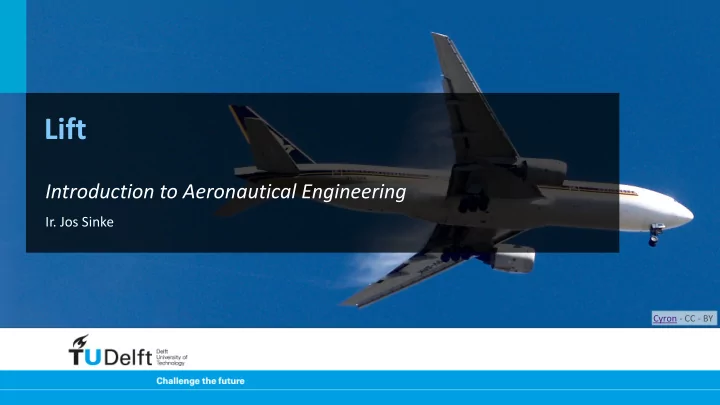

Lift Introduction to Aeronautical Engineering Ir. Jos Sinke Cyron - CC - BY
Lift equation Lift is given by: L J. Scavini - CC - BY - SA
Lift equation Lift is given by: L What is the unit of C L ? J. Scavini - CC - BY - SA
Lift coefficient - The ‘efficiency’ of the airfoil in generating lift - Depends on airfoil & angle of attack
Airfoils
NACA airfoil notation Mean camber line Thickness Camber Trailing edge (TE) Leading edge (LE) Chord c Chord line NACA 2412 means: - 2% camber (of chord length) - At 0.4 of the chord (from LE) - And 12% thickness/chord ratio
Other lift parameters Wing surface area S - A design parameter Velocity V - A design parameter Air density ρ - Depends on altitude & temperature Revedavion.com - CC - BY - NC - SA
Where does lift come from? Bernoulli’s law: “Sum of static and dynamic pressure is constant” V V V Higher velocity mean lower pressure! p p p So lift by pressure difference
Airfoil lift Velocity change Pressure distribution Lift & Drag Low pressure L D High pressure Try yourself: NASA Foilsim
Velocity measurement Question: Can we use Bernoulli’s law to measure speed? p s Pitot tube p tot p s p tot - p s We measure airspeed
Lift curve C L [-] C Lmax α [°]
Take-off and landing - What to do if we want to fly at low speeds? - W does not change - If V should decrease, C L and/or S should increase - Devices to do both! Y. Yosiaki - CC - BY - SA
High lift devices Slats Flaps Dmitry Terekhov CC - BY - SA
Flaps Slats High lift devices C L [-] Purpose: Fly at low speeds By: Increasing critical Increasing Increasing wing area S α [°] Slats: Flaps: NiD.29 - CC - BY - SA
Wing geometry c t Λ c r Wing span Wing surface area Root chord S Tip chord b Taper (=c t /c r ) Sweep angle D. Busiak - CC - BY - NC - ND
Lift M. Visser - CC - BY - SA
Recommend
More recommend